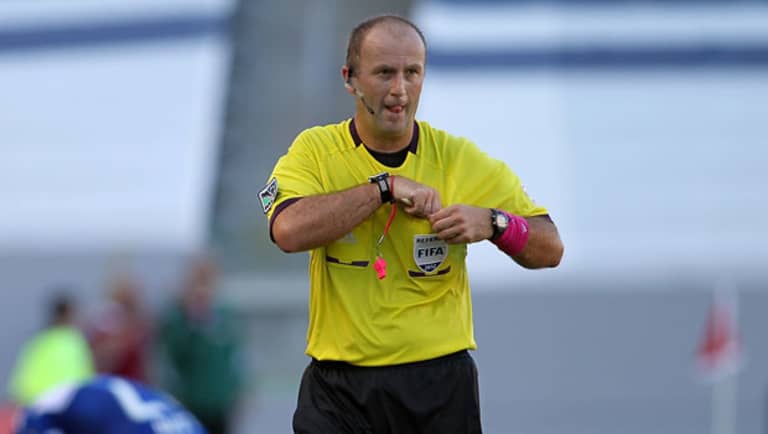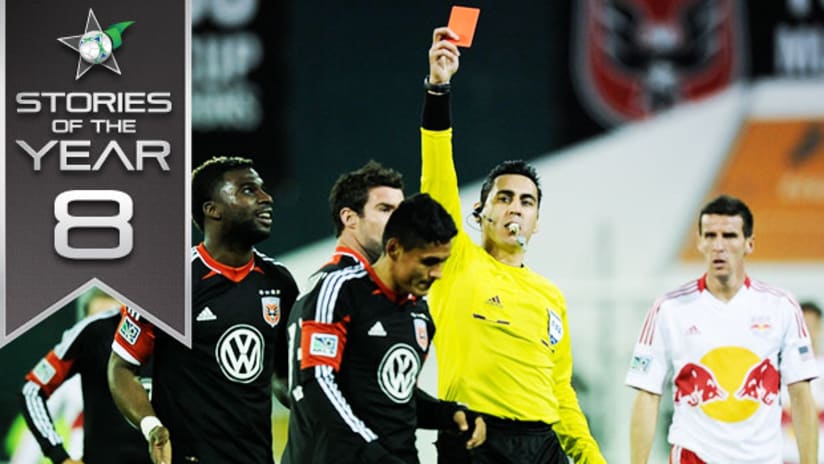As the Best of 2012 series continues on MLSsoccer.com, we're counting down the 12 most important stories of the year in Major League Soccer. We'll take a look at one story per day from Dec. 19 until Dec. 30, when we unveil what our panel of 20 editors, writers, videographers and statistics specialists voted as the Story of the Year in MLS in 2012.
MLSsoccer.com contributor and Starting XI writer Charles Boehmtakeson the story at No. 8, which played out all season long. The MLS Disciplinary Committee suspended players for a number of infractions in 2012, ushering in a new era where big brother was always watching.
You could measure the impact of the MLS Disciplinary Committee on the 2013 season by tabulating the total amount of the fines meted out to offenders around the league, or maybe the overall number of player minutes lost to the retroactive suspensions the committee handed out with its unprecedented reliance on postgame video evidence.
Perhaps the most dramatic illustration, though, can be ascertained via a standard measuring unit of the internet. Conduct a Google search on “mls disciplinary committee” nowadays, and you’ll find about 230,000 results to comb through.
The same search on opening day back in March? It probably wouldn’t have netted enough links to fill a page.
“This year there has been a slight modification,” MLS Executive Vice President Nelson Rodriguez said in the run-up to First Kick 2012. “One that will allow the Disciplinary Committee greater latitude to administer supplemental discipline, if it felt necessary.”
MY MOMENT OF THE YEAR
by Peter Walton

Silviu Petrescu in the MLS Cup
When Petrescu (above) blew the final whistle on the MLS Cup final, for me, that was a great game being remembered for the players, atmosphere and the occasion, and my officials could drift away into the background without being spoken about. That was a great feeling for me.
I was at the game with my fingers, toes and eyes crossed. I spoke to him before the game and the conversation was a fleeting one, but I said that the game should come to him, rather than him going to the game. He fully understood that. The game was about the occasion and about the players, and if he needed to intervene it would become obvious. And he carried out that word of advice to the letter.
In fairness, you ended up with great entertainment and for the players themselves, I’m sure they enjoyed that as well because they were allowed to have a fast, free-flowing game that had physical intentions, but didn’t have anything that were outside the boundaries of the acceptance of the law. That’s exactly how Petrescu refereed the game.
Indeed there was. And the five-member committee of ex-players, an ex-coach and an ex-referee whose identities are kept anonymous to prevent what Rodriguez calls “undue pressure” from outside influences, used that empowerment to startling effect.
Even after preseason warnings, the committee’s muscular approach turned heads across the league, with a raft of healthy suspensions administered for elbows, late tackles, allegedly slapping a ball boy, kicking a ball at a referee – anything and everything the match referee might have missed or let go too easily.
This year, hacks would have nowhere to hide.
At least, that was the idea. A litany of serious injuries to the likes of David Ferreira, Steve Zakuani and Javier Morales shocked observers in 2011, and cast a harsh spotlight on the danger posed by clumsy and malicious challenges on creative players. The kind of players that fill the highlight reels, make their teammates better and raise the level – and the profile – of a league with big ambitions and a forward-leaning approach to fulfilling them.
The new reality sank in at the beginning of April, when a particularly lengthy weekly release from the committee handed out four retroactive punishments for a range of offenses in two games – two of which were given to opposing players for their actions on the same play.
Shielding the ball near the corner flag, FC Dallas’ Jair Benitez lashed his elbow into D.C. United winger Danny Cruz’s chest and was duly disciplined – but so was Cruz, who earned a fine for clutching his face in an effort to play up the contact, an “act of embellishment, which brought the game into disrepute,” in the words of the committee.
The careful parsing of that momentary sequence drove home the painstaking extent to which the committee was evaluating controversial sequences. And when called upon to elucidate the motivations behind it, league officials made no secret of the fact that they expected players and coaches to take notice of the increased risk of suspension and adjust their behavior accordingly. The front office, it seemed, had grown weary of the perception that rough, physical play was part and parcel of MLS.
“It’s really about trying to get everyone to understand what we want our league and the play on our fields to look like,” Rodriguez told Sporting News in April. "It’s what we believe our fans want but equally important, what we believe to be in the best interests of player safety."
This did not sit well with many of those who found their wrists being slapped a bit harder, of course, as the committee’s decisions became a reliable source of discussion and debate.
“When you're playing out there, the inconsistency that you feel comes with the Disciplinary Committee later, it affects the way you play sometimes,” New England coach Jay Heaps said in July, after Revolution midfielder Kelyn Rowe was retroactively suspended for catching Ryan Meara with his shin as the New York goalkeeper claimed a through ball at his feet.
“We know why the Disciplinary Committee is in there and we know why they review plays. Sometimes, when the decision is made, you just put your arms up and say, 'Why?'”
Everyone felt the sting at one point or another. The Vancouver Whitecaps groused when Barry Robson was suspended less than 24 hours before an important match at Seattle on August 18 for his “aggravated dissent” in the previous Wednesday’s match, while the three-game ban handed out to Rafa Márquez for a rugby-style tackle that broke Shea Salinas’ collarbone in March was seen as overly harsh in some quarters and too lenient in others.
Whether you thought the Disciplinary Committee’s assertiveness was long overdue, or a chilling step towards an “Orwellian dystopia,” as one analysis put it, there was no escaping the sense that it signaled a brave new world has arrived for MLS.










